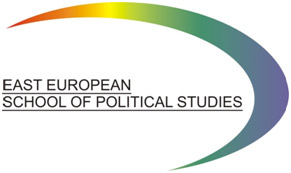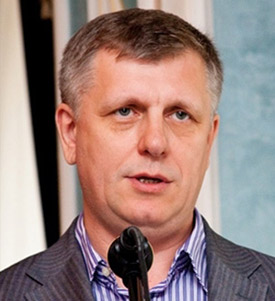Belarus - East-European School of Political Studies (2007)
The East-European School of Political Studies (EESPS) has been in operation since 2007 as one of the Council of Europe’s Schools of Political Studies. The goal of the school is to create new horizons and new opportunities for young leaders in Belarus and to promote cooperation between them, as well as with experts and colleagues from the Schools abroad. The EESPS is registered in Ukraine but works for Belarus, holding most of its events outside the country.
3 Oleksievska street
Solomenskiy district
03110 Kyiv, Ukraine
Tel: +375 29 651 41 97
Fax: +375 17 228 58 84
E-mail: This email address is being protected from spambots. You need JavaScript enabled to view it.
Director: Alexander DABRAVOLSKI


“Being a European country and having common borders with the EU states, Belarus cannot forever retain an authoritarian regime, as it needs significant external resources to sustain itself. Therefore, the future of the country tomorrow will be determined by the young leaders who are today showing success in politics, journalism, business, administration and the social sciences. It is these people that the East European School of Political Studies aims to support. We are searching for such people, trying to open up new horizons and opportunities to promote dialogue and cooperation between them, supported by their cooperation with experts and colleagues from the family of Schools of Political Studies in many countries.”
Alexander DABRAVOLSKI, Director
About the School
Belarus is the only European country that is not a member of the Council of Europe. The exceptional situation of Belarus is due to the fact that the authorities have tried to invent a unique model of development that is, to a large extent, based upon traditional Soviet attempts to establish centralized control over social processes. These conditions make receiving information for policy-making problematic not only for the society, but even for the authorities themselves. Political culture without practical politics in society is facing the need for renewal.
The current conditions significantly hamper the development of civil society and any other public activities. Public politics in Belarus are virtually non-existent, and there is not a single opposing faction in the Belarusian Parliament. Public discussions are lacking media attention, as the media are monopolized by the government.
Nevertheless, there are important prospects here for active young people who care about the future of their country. The mission of the East European School of Political Studies is to promote the establishment of political culture based on the respect for human rights and values of freedom and democracy in Belarusian society.
The objectives of the School are:
· To assist young public leaders in expanding their scope of interests, establishing new contacts, new knowledge and new opportunities
· To promote dialogue and cooperation between young leader and with experts and colleagues from abroad
· To promote building of professional capacity and influence of young leaser in Belarussian society.
The training cycle lasts for one year. As a rule, three field sessions of 2-3 days are organized for participants. During the sessions, experts including scholars and politicians from Belarus and other countries are invited to share their views and experiences. Participants also work on their assignments in between the sessions, presenting the results of their work at meetings in Minsk. School alumni are often present at such meetings, which adopt a Roundtable format.
Each year the School selects new participants among political and public leaders, social scientists, journalists, business people, and members of local and state government. Most participants are under 35 years of age. Please contact the School directly for more information about the application procedure.
About the Director
Alexander Dabravolski graduated from the Belarusian State University from the departments of Radio Physics and then Law. After working as an engineer-designer and scientific fellow he was elected as an MP in 1989. In addition to sitting on committees including the Committee on Industry, the Committee on Human Rights and Freedoms and the Subcommittee on Mass Media, Alexander helped found the United Democratic Party of Belarus (UDPB) in 1990 and became involved in the opposition, serving as the vice-chairman of the United Civil Party (UCP). From 1992 to 1995, he also served as the Deputy Director of the Independent Institute of Socio-Economic and Political Studies. He is currently a member of the Political Council of the United Civil Party and has been the Director of East European School of Political Studies since 2008.






